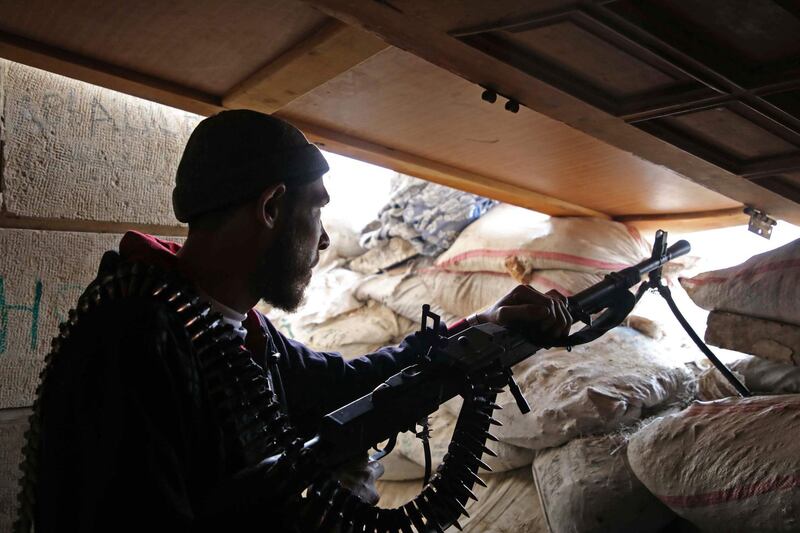Regime artillery shelled a Russian and Turkish-brokered demilitarised zone in north Syria on Sunday night, leading to civilian casualties.
The Syrian Observatory of Human Rights, a British based war monitor, reported the shelling around the areas of Latamna and Al Sarmani in north-eastern Idlib province, north of the city of Homs.
Areas around Aleppo were also targeted. Rebels reportedly responded with rocket fire and the observatory said that there were now escalating violations of the terms of the demilitarised agreement in four governorates.
The rebel areas targeted are reportedly held by elements from the National Front for Liberation, a coalition of 11 rebel and Free Syrian Army groups backed by Turkey.
There were reports that the shelling continued into Monday and that schools in the rebel-controlled enclave were closed in some areas of the province due to the fighting.
Representatives of Iran, Russia and Turkey met in Kazakhstan's capital Astana last Wednesday to discuss the crumbling 11-week-old truce in Idlib as ongoing clashes between the regime and rebels threatened to derail the agreement.
The fragile truce in Idlib came under strain this week after Russia launched air raids on rebel positions in neighbouring Aleppo. It was the first such attack since Moscow and Ankara agreed in September to create a demilitarised zone in the area to prevent a full-scale government assault.
The September deal between Russia, which backs Damascus and has forces in Syria, and opposition backer Turkey aimed to set up a demilitarised zone around the north-western region of Idlib to protect it from a regime assault and prevent a humanitarian catastrophe in the heavily populated province.
With the area home to over 3 million people, many of which have been internally displaced by fighting in other areas of the country, the international community feared the regime assault could lead to the bloodiest phase of the conflict.
______________
Read more:
Crumbling Idlib truce tops agenda as Iran, Turkey and Russia meet in Astana
Warplanes target rebels in Aleppo hours after suspected gas attack
Opinion: Idlib peace must hold or the mix of global powers could lead Syria’s bloodiest slaughter yet
______________
Meanwhile, a 54-year-old Argentinian woman who was lured into Syria two years ago on a marriage promise was finally on her way home on Saturday.
History teacher Nancy Roxana Papa had accepted the invitation of a Syrian man she had met online three years earlier and travelled to Turkey in 2016, before entering Syria.
"She returned to Turkey on Saturday after the required legal documents... were completed" for her entry into Turkish territory, said Bassam Sahiouni, an official from the local rebel authority in Idlib province.
On October 30, the "Salvation Government" — set up in rebel-held Idlib by the Hayat Tahrir al-Sham hardline group — handed Ms Papa over to the Humanitarian Relief Foundation, a Turkish non-governmental organisation, at the Bab Al Hawa border post.
She then had to remain in Syria for over a month to await completion of administrative and legal procedures for her repatriation.
The Argentinian teacher had appeared on October 30 at a news conference organised by the militants at the border, where she thanked her country's diplomatic services, the Turkish authorities and the "Salvation Government.
"You saved my life," she said, drying her tears after Mr Sahiouni explained the circumstances of her misadventure.
He had given an account of the teacher's apparent ordeal at the news conference.
She met the man posing as her future husband in a hotel in Turkey and "he told her they would go to Syria to greet his parents," the rebel official said.
She entered Syria illegally in 2016 and was immediately kidnapped by a gang that was waiting for her on the other side of the border and contacted her daughter to demand a ransom, Mr Sahiouni said.
He added that she managed to escape from her captors after a year and survived in the war-torn area by staying with residents and moving from home to home.
The "Salvation Government" sought to address the case earlier this year and tried without success to contact Argentina's foreign ministry, before the Humanitarian Relief Foundation eventually dealt with her situation, Mr Sahiouni said.
Last year, Hayat Tahrir Al Sham reunited a Belgian girl with her mother, after the death of the four-year-old's father, a radicalised criminal who had entered Syria with the child in May 2017.
In February 2018, the same authorities handed over to Turkish officials two Canadian nationals who were held for several weeks after entering Syria for obscure family reasons.






